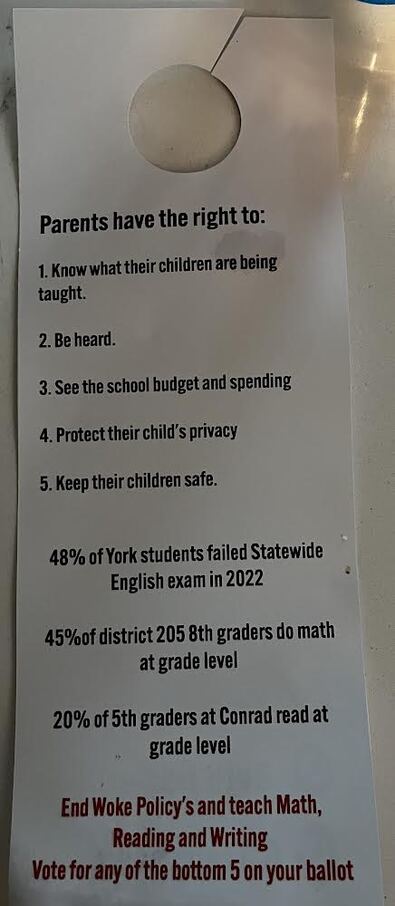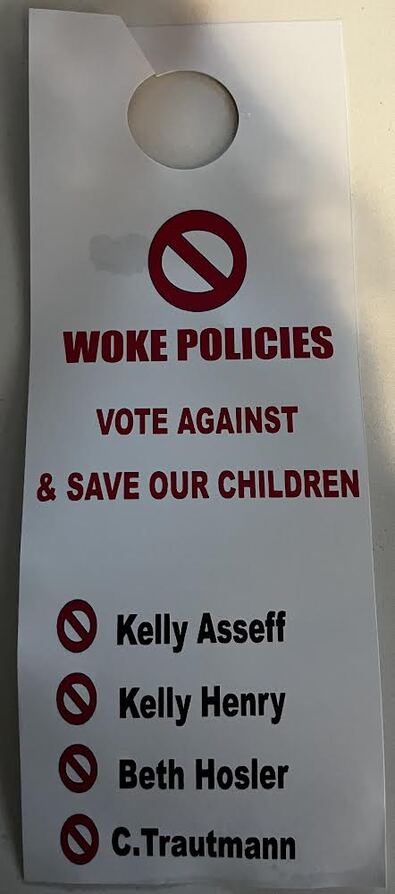|
*** Live election night coverage ***
Tuesday, Apr 4, 2023 - Posted by Rich Miller * Live updates and results from various media outlets…
* Chicago Tribune * Crain’s Chicago Business * WGN TV * NBC 5 * CBS 2 * State Journal-Register * Daily Herald If you find anything I’ve missed, please let me know in comments. Some outlets just didn’t have anything in place as of late this afternoon. * I’ll adjust this live tweet list as we go along, adding or subtracting as necessary. You’ll likely see a bit of off-topic content here until the polls close and votes start to come in…
|
|
IEA says school board candidate banned from school district property, and other stories from the front
Tuesday, Apr 4, 2023 - Posted by Rich Miller * From the IEA…
…Adding… As noted in comments, Kristina Konstanty was endorsed by Awake Illinois yesterday. * Last week…
1776 Project PAC mailer… 
* On to these unusual doorhangers in the Elmhurst area, which Isabel told you about yesterday. Notice that they have no “Paid for by” notification on them… 
“Vote for anyone except these people,” is a different way of doing things. They even have a website…
Some folks sure are upset about equity. Also, note how they claim these liberals are somehow book burners…  And not a single “Paid for by” on the site that I can find.
…Adding… Tom Chavez, Lan Li, Linda Nudera and Jammie Esker Schaer were all endorsed by Awake Illinois yesterday. * Isabel’s roundup… * : In Illinois, this ideological battle is on full display in Tuesday’s elections as residents throughout the state vote in mayoral and school and library board elections. Local school and library board elections, nonpartisan by design, now are subject to credible threats from candidates intent on furthering exclusionary policies such as book bans and opposition to diversity, equity and inclusion policies. The Democratic Party of Illinois has made an unprecedented commitment of $300,000 to combat them. * Pantagraph | Meet the District 87 school board candidates: The four candidates for the Bloomington District 87 school board spoke with The Pantagraph recently about their priorities and goals if elected during Tuesday’s election. * Patch | 9 Candidates Up For 4 Seats On District 200 Board: Nine candidates are in the running for four seats on the Community Unit School District 200 Board of Education. Two candidates are facing off for one unexpired two-year term and seven are vying for three open seats with full four-year terms. * Patch | 4 Vie For 3 Seats On Palos Dist. 118 School Board: Four candidates running for three open seats on the Palos Dist. 118 school board in the April 4 consolidated election. Two candidates out of four responded to the Patch candidate questionnaire. * Patch | ETHS, D-65 Elections: Who Will Be Elected To Evanston School Boards?: With only two incumbents running for three open seats on each of Evanston’s public school boards, there are bound to be new faces elected on Tuesday in Evanston/Skokie School District 65 and Evanston Township High School District 202. * Patch | Nothing Quiet About D86 Board Race: Three of the candidates, Kay Gallo, Catherine Greenspon and Andrew Catton, are outspoken critics of Superintendent Tammy Prentiss, who was promoted in 2019. Like the other three, candidate Asma Akhras criticized the way Prentiss handled a high-profile incident involving an anti-racist consultant. Still another, Deborah Willoughby, praised the superintendent in a Patch questionnaire. * Patch | 4 Vie For 3 Seats On Plainfield D202 Board Of Education: The candidates are Savena Joiner, Elias Kalantis, Margarita Morelos and Heather Roach. The only incumbent is Roach, who was first elected to the position in 2015 and reelected in 2019. Kevin Kirberg, who currently serves as Board president, and Treasa Howard-Collins are not seeking reelection. * Patch | Progressives Vs. Conservatives In Elmhurst D205: During the pandemic, Elmhurst school board meetings became battlegrounds over issues such as school shutdowns, masks and critical race theory. Public comments at times became heated. At one meeting, the board recessed for about five minutes when mask mandate backers shouted down a public commenter who refused to wear one. * Patch | 6 Vie For 3 Seats On Mokena 159 Board Of Education: According to candidate questionnaires submitted to Patch, Tunney is the lone candidate with school governance experience and is the current President of the Mokena PTA. Coleman and Fryer did not respond to multiple requests from Patch to submit questionnaires. * Patch | 8 Candidates Run For 3 LTHS Board Of Education Positions: Tylka-Shaw and Lewandowski are both incumbent board members. Tylka-Shaw serves as secretary of the board, and was elected in 2019. Lewandowski has served on the board since 1999. According to the District website, Lewandowski is an LTHS alumnus and “wants to provide a safe and secure environment to educate all LTHS students and to continue to work with the administration to establish goals for improving student achievement.”
|
|
*** UPDATED x1 *** Afternoon precinct reports
Tuesday, Apr 4, 2023 - Posted by Rich Miller * Hope everyone is OK…
More here. * Hopefully, things are a lot calmer near you. What’s going on out there? *** UPDATE *** Over…
|
|
That toddlin’ town roundup
Tuesday, Apr 4, 2023 - Posted by Rich Miller * You could hardly get more different results if you tried. As the crosstabs show, this IZQ poll vastly differs with the Victory Research poll on men and on race. VR had Vallas up by 13 points among men. The IZQ poll has them tied, 48-48. VR had Vallas leading among whites 76-19, the IZQ poll has Vallas up by just 10, at 54-44. VR had Johnson up among Black voters 76-20 with 3 percent undecided, but this IZQ poll has Johnson leading 64-22 with 14 undecided. VR had Vallas up 50-43 among Latino voters, while this IZQ poll has Vallas up by 17 points. Also, the VR poll had the two tied among those who had voted and had Vallas leading 50-43 among those who hadn’t yet voted, while this poll had large Johnson leads among early voters and had Vallas leading by just 4 points among those who were waiting until today. And, according to this poll, Vallas is still stuck at 45..
* Meanwhile…
* And…
…Adding… Heh…
* Isabel’s roundup… * Tribune | Election Day in Chicago: Voters will choose Brandon Johnson or Paul Vallas as city’s next mayor, with a tough job awaiting the winner: Vallas, a 69-year old former schools chief, has long been a critic of the Chicago Teachers Union that Johnson helps lead, asserting the union’s work stoppages during the pandemic harmed children’s well-being and hurt their growth for generations. Johnson, 47, regularly paints Vallas’ approach to public education as “morally bankrupt” for his promotion of private school vouchers and expansion of charters across the country. * Sun-Times | Chicago Runoff Election 2023: Live results, voter reactions and news updates: Try not to hold your breath for the final outcome. The winner may not be known for days. “I highly doubt either camp will concede on election night because up to 100,000 votes may not be counted when we go to bed on election night,” said pollster Matt Podgorski of M3 Strategies, whose polling correctly placed the top four finishers in Round One of the mayoral sweepstakes within roughly half a percentage point. * Tribune | Early voting is up in runoff compared to February but overall voter turnout remains unclear: Through Sunday night, about 155,000 people voted early in person, while 95,000 had turned in their mail ballots for a total of nearly 250,000 ballots cast. In the February election, the total number of ballots cast two days before Election Day was a little more than 211,000. After all mail ballots were counted, February turnout was 36%, slightly higher than both rounds of the 2019 election, but lower than the 2011 election and the runoff in 2015, when it was 41%. * NBC Chicago | 7 City Council Races to Watch in the 2023 Chicago Runoff Election: The race to replace Ald. Roderick Sawyer was closely-watched throughout the campaign, and William Hall and Richard Wooten earned spots in the runoff, finishing just 71 votes apart. Hall was endorsed by Illinois Gov. J.B. Pritzker in the first round of voting, and also received support from the SEIU and Chicago Teachers Union. * Tribune | Chicago’s runoff election: Everything you need to know about races for mayor and aldermen: In the 14 races for City Council that have not yet been decided, six involve incumbents who didn’t exceed the 50% threshold, three of whom Mayor Lori Lightfoot recently appointed to the seats. * ABC Chicago | Chicago Election 2023: Full coverage of mayoral race, city council seats and more: As of about 9 a.m., there have been 304,090 total ballots cast, a 19.1% total citywide turnout so far. * Crain’s | Keep a close eye on these signals in today’s mayoral vote: So far, turnout in early and mail-in ballots has been significantly higher than in the past two mayoral general elections. That likely helps Vallas since Johnson has a much better field operation that Vallas needs to offset by having big numbers of voters turn out on their own. That’s also the main reason why polls and political insiders are giving Vallas a small edge. But if the weather tomorrow is as bad as the weather folks say — damaging storms with high winds and pelting rain are in the forecast — turnout could drop. But if the storms don’t hit until, say, 4 p.m. — or if more people vote early today — it may not matter. * Politico | The final hours of Chicago’s too-close-to-call mayoral runoff: The issues of crime and policing have dominated the runoff election, which was necessary because no candidate earned a majority of the vote in the first round of voting back in February. Vallas (33 percent) and Johnson (22 percent) finished first and second, respectively, while Lightfoot (17 percent) was eliminated after a third-place finish. * South Side Weekly Op-Ed| There is No Ethical Path to Voting for Paul Vallas: This election is not rare in having two imperfect candidates squaring off. It is rare because the battle we face is rooted in the eternal American debate about race and our history, and carries huge implications for the future of our country. In this debate, there is no ethical path that allows a vote for Paul Vallas. * Sun-Times | Rep. Jesus ‘Chuy’ Garcia’s daughter, 28, dies: “Last night our beloved daughter, Rosa, passed away at the age of 28. We are completely heartbroken,” Garcia said. * Chalkbeat | Chicago staffs fewer National Board certified teachers as it pushes to grow their ranks:A Chalkbeat analysis found the overall number of board-certified teachers has decreased steadily, even as the number of educators Chicago Public Schools employs has grown. About 1,000 of the district’s more than 22,000 educators are board-certified, down almost 30% since 2016. * WGN | Police payouts soaring in city of Chicago: The city of Chicago has paid more than $578 million since 2016 in judgments, settlements and legal fees relating to claims of police misconduct. It is a staggering figure but observers say taxpayers aren’t done paying yet. They predict millions of dollars more will be spent as legal cases relating to a notorious former officer wind through the courts. * Block Club | Greektown Starbucks Workers Win Union Election, Become Chicago’s 8th Unionized Shop: The Greektown cafe is the eighth unionized shop in Chicago and one of more than 250 unionized shops nationwide. A ninth unionized shop in Edgewater closed in October right as workers were scheduled to begin contract negotiations. * Sun-Times | Firefighter killed, 2 others hurt at extra-alarm fire in West Pullman: Pelt joined the Chicago Fire Department in 2005 and was based on the South Side his whole career, according to Nance-Holt. He had celebrated a birthday in March and just walked his older daughter down the aisle. She was on her honeymoon at the time of the incident. Pelt’s younger daughter is 6 years old. * Block Club | Midtown Athletic Club’s Cleaning Staff Spoke Out About Safety Concerns. Then, 33 Workers Were Fired: A member of the Bucktown gym joined protesting workers this weekend. “I ask Midtown, why not show the same care and respect to your employees that you show for your members?” * Chicago Mag | A Very Daley Tour of Bridgeport: What’s the point of being mayor if you can’t guarantee yourself the best police and fire protection? The police station on the corner of Daley’s block housed the limousine that drove him to City Hall every morning and the squad car that guarded the alley behind his house. The police district has relocated to a modern building on Halsted Street, but the firehouse remains. * WTTW | Family-Owned Chicago Flag Company Has Been Supplying Symbols of Civic Pride for 108 Years: “We were here long before TV, we were here long before radio. W.G.N. Flag and Decorating Company, since 1916 and named after the family. Yeah, unfortunately those media outlets have nothing to stand on. I love ‘em but we were here first,” said Carl “Gus” Porter III. “The company actually started by my great grandfather purchasing a stick flag from a street merchant, walking down the street, and selling it for twice what he paid for it.”
|
|
Open thread
Tuesday, Apr 4, 2023 - Posted by Isabel Miller * It’s Election Day! What’s going on in your part of Illinois?… …Adding… [From Rich] Let’s also use this post as a morning precinct report. What are you seeing out there? Let us know where you are if you can. …Adding… Fresh thread is here.
|
| « NEWER POSTS | PREVIOUS POSTS » |



















